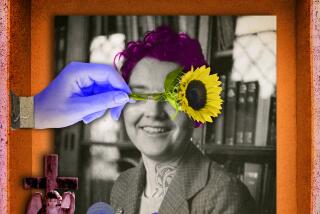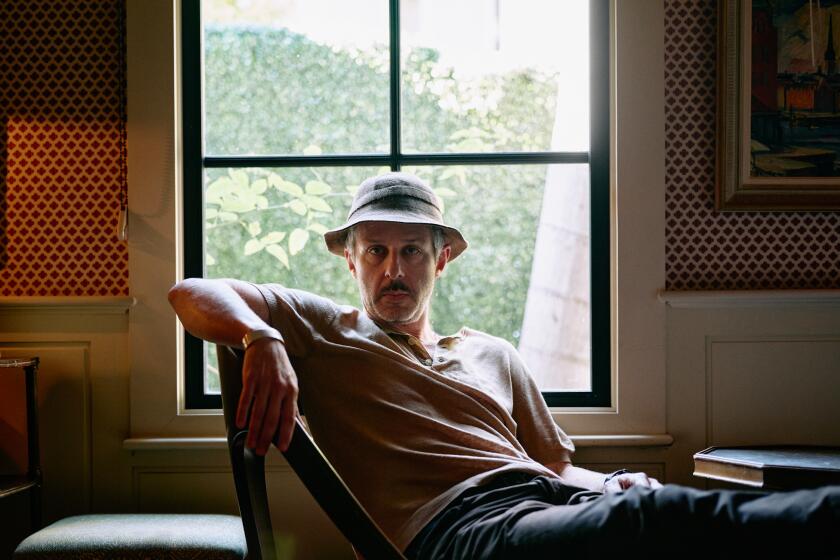Review: ‘Madre’ expands into a mesmerizing drama from its origin as an Oscar-nominated short
The Times is committed to reviewing theatrical film releases during the COVID-19 pandemic. Because moviegoing carries risks during this time, we remind readers to follow health and safety guidelines as outlined by the Centers for Disease Control and Prevention and local health officials.
The opening shot of Rodrigo Sorogoyen’s “Madre,” a mesmerizing expansion of his Academy Award-nominated short, is of a beautiful and forbidding beach blanketed by low clouds and empty but for the muted sound of the surf.
Next, a woman named Elena in Madrid receives a phone call from her 6-year-old son, Iván, who is on a camping trip with his father somewhere on the coast of southwest France. The boy is alone on a beach, his father having left momentarily to retrieve some toys from their camper, and he’s scared.
In a few harrowing moments, made more intense by a dying cellphone battery, the father does not return, but we hear a stranger approach, and the boy is suddenly no longer on the other end of the call.
In the adaptation, Sorogoyen and his cowriter, Isabel Peña, move forward 10 years — in a different direction than one would assume from the opening. Elena is living in Vieux-Boucau-les-Bains, the French coastal town where Iván vanished, managing a cafe and walking the beach daily. The locals gossip about her. She’s the crazy woman who lost her son.
Each subsequent cut to the beach is accompanied by the now unsettling roar of the waves, the lone witnesses to Iván’s disappearance. The once empty sand is populated by tourists and surfers, leisurely enjoying the waning days of summer.
The heart-pounding tone of the opening is replaced by the calm of settled grief. Elena, played by Marta Nieto, her eyes a deep well of pain, has a new life and a boyfriend, Joseba (Alex Brendemühl), but she is not really living.
One day, she sees a boy, Jean (Jules Porier), who is 16, on the beach. She follows him home and watches him share a meal with his parents and two brothers. Later, Jean shows up at the cafe, aware that Elena had followed him and intoxicated by the idea that this attractive, elusive older woman might be interested in him.
The two begin an odd, tentative friendship with Sorogoyen enticingly keeping us off balance as to where it is headed. Jean flirts and cajoles. Elena loosens up, her somberness gradually replaced by something like joy. She knows she’s on precarious ground, but she cannot stop seeing Jean.
There is an emotional flow to the film that takes us not into Elena’s thoughts but her soul. Nieto is so riveting that we feel everything she feels, articulated through a look, a raised eyebrow, a gesture or her body language, without ever knowing what she’s thinking. It’s the type of fully-inhabited performance that stays with you long after the fade out.
Porier is excellent, his guileless, mischievous man-boy reminiscent of a young Leonardo DiCaprio or Timothée Chalamet.
Tension permeates the central relationship. It’s sweet and awkward but charged with a sensuality and longing that is simultaneously thrilling and uncomfortable. There is a sense of being in a moment so powerful that we see and feel what we want rather than the truth.
Despite its melancholy bearing, “Madre” is a hopeful meditation on grief and memory. Wreathed in natural beauty — the Nouvelle-Aquitaine coast and the nearby Pyrenees — the film’s sadness and empathy are a soothing balm in these troubled times.
‘Madre’
In Spanish and French with English subtitles
Not rated
Running time: 2 hour, 9 minutes
Playing: The Lot Fashion Island, Newport Beach; also available via virtual cinemas, including Laemmle Theatres; and on premium VOD
More to Read
Only good movies
Get the Indie Focus newsletter, Mark Olsen's weekly guide to the world of cinema.
You may occasionally receive promotional content from the Los Angeles Times.











